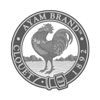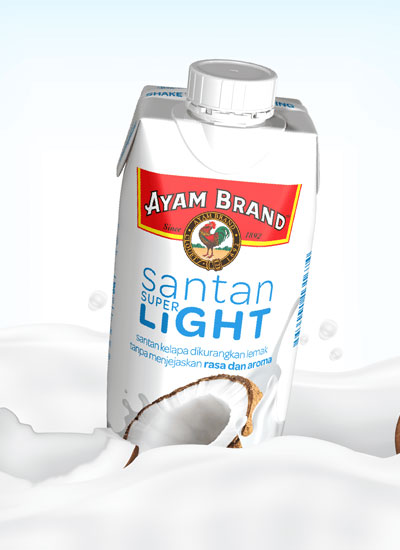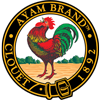Browse help topic
About Our Brands?
Ayam Brand™ products are manufactured in state-of-the-art facilities that meet the highest international standardsd with worldwiwde-recognize certifications and are certified 'HALAL'.
HACCP MS 1480:2007: The optimum system of preventive controls and most effective process to protect against food contamination.
ISO 9001:2008 QMS: A quality management system to deliver a consistent top quality to consumers. HALAL MS 1500:2009: Strict supervision and certification from JAKIM Malaysia. Other HALAL certifications are issued by official certifications bodies recognized by JAKIM.
For many years, Ayam Brand™ Malaysia is giving back to those who needed most. Every years 2 months of food supplies are distributed nationwide to charitable homes to support the elders, disabled and orphans.
With an environmental logic, Ayam Brand™ believes that the whole product should be used in the process to limit waste therefore we are engaged in a long term production program to reduce waste and carbon footprint.
For our coconut range: our factory process the whole coconut (water, oil, milk and cream) and the only waste, the coconut shell, is collected and used for the burners to replace the usual fossil energy, like oil or gas.
In the case of our fish factory, we are working on special machinery that will process the rejects to produce Fish Hydrolyzed Protein for the pharmaceutical industry.
We minimize packaging and work mostly with simple packaging material like tin, glass or paper, which are 100% recyclable.
About Our Quality?
Tuna range: the ingredients are gluten free. Our tuna factory has an organization that actively prevents allergen cross-contamination.
We also do random checks on our products to ensure that our products do not have various types of allergen cross-contamination. However as we do not make such public claims for this range of products, we currently do not have a systematic allergen control and gluten free certification.
Ayam Brand™ has, for many years, implemented a responsible policy for the use of palm oil, by replacing it, wherever technically possible, by alternative vegetable oils with a healtier nutrient profile. For the few Ayam Brand™ products still using palm oil, our factories only source segregated certified sustainable palm oil of West Malaysia origin.
Ayam Brand™ only uses tuna species, which are not endangerede & from biomass that is healthy (not overfished).
Big marine predators like shark, whale, swordfish an some big tuna species may contain traces of methyl mercury beecause the mercury concentrations increase at the top of the food chain.
Ayam Brand™ selects only small size fishes from two species of tuna: skipjack and small yellowfin.
Because the selected tuna are relatively small, they are naturally unlikely to concentrate mercury like big size predators.
Notwithstanding the tuna selection, Ayam Brand™, for the total peace of mind of its tuna consumers, send each and every batch of its tuna production for and independent laboratory mercury analysis.
Ayam Brand™ makes sure that its tuna productions comply with the most stringent food safety regulations in the world.
Monosodium glutamate is flavour enhancer because it balances, blends and rounds the total perception of other tastes. You can find it under the food addictive E621. But if the recipe is good and the ingredietns are fresh, what is the point of having added MSG? Ayam Brand™ canned food is guaranteed without added MSG to provide you with only the best recipe.
About Canned Food?
Canned products are cooked in the can as part of the canning process. This means that they are always fully cooked in the sealed can and may be eaten straight from the can without the need for additional cooking. However, you can warm them up or use them as ingredient in your favourite cooking recipe.
Unopened canned products should be stored in a cool, dry place where they can last for rup to three years in your pantry unless the "best before" date says sooner.
Use a clean and rust-free can opener, or look for pull-tab cans, and wipe the top of a can before opening.
Do not store foods in opened cans in the refrigerator, instead, transfer unused contents to a safe storage container and place immediately in the refrigerator for up to four days.
A can is the best way to preserve the textire, presentation and taste of processed food for long, without adding preservatives.
Caning process uses sterillization, invented by a French cook in 1810 to preserve food in such a stable manner that it could be stored and shipped overseas all year long.
Cans are vacuumede then sealed in air tight conditions and go through a high temperature and controlled heating process. The heating process kilss bacteria and preserves the food.
The product can be safely consumed without the help of preservatives.
More info: http://www.mfca.org.my.











